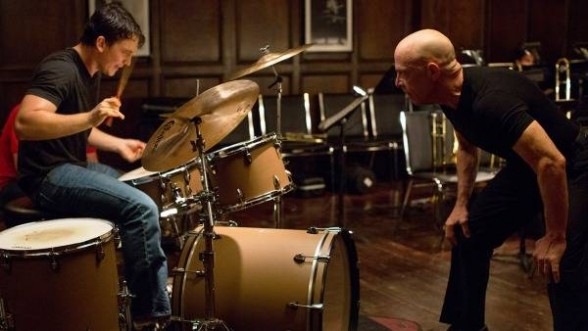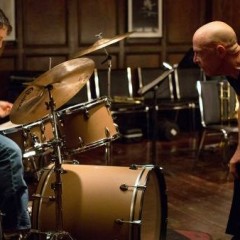[Get the scoop on “Whiplash,” a film that opened the 2014 Sundance Film Festival and is now up for a bevy of awards at this weekend’s Oscars, including Best Picture. Donald finds personal connections to his own conservatory experience. — the Artblog editors]
What will a young man do for what he loves: his art? How far is too far? When does one draw the line in this everlasting mission? The answer is unclear, as any serious artist knows that you spend your entire life searching for the best result. The “best result” can be another term for perfection, which is impossible, of course. Perfection is like a continuous mathematics problem. You can only go to infinity and beyond, as there is always room to improve your craft. That’s exactly what “Whiplash” shows us, in an exhilarating fashion.
Striving for greatness

The film centers on Andrew Neyman (Miles Teller), a first-year jazz drum student at Shaffer Conservatory, the most prestigious music school in the United States (albeit a fictional school). Neyman wants to be one of the greats, just like his musical hero, Buddy Rich. Neyman is selected to be in the school’s top jazz orchestra, run by conductor Terence Fletcher (J.K. Simmons). He soon learns the relentless task it is to be considered “great,” thanks to Fletcher.
Fletcher is a highly demanding taskmaster (that’s putting it as lightly as I can) who demands perfection from all of his students by any means necessary. This means tiptoeing into what some would consider mental, emotional, and even physical abuse. During Neyman’s first rehearsal with the jazz orchestra, Fletcher throws a chair over his head when Neyman doesn’t get the exact tempo Fletcher indicated. Fletcher will stop at nothing to get the results he desires from his students.

Neyman soon realizes, through Fletcher’s agitating actions, that he must sacrifice everything else in his life in order to be a great artist. This means no social life whatsoever. It requires him to practice from sun-up till sundown–until the blood can’t be contained in his countless Band-Aids, and finally splatters all over his drum set. In the midst of a medical emergency, Neyman goes onstage to play in serious pain. This shows us that nothing can get in the way of a focused artist’s undying passion.
Award-worthy performances
Miles Teller is an exciting young talent who plays Andrew Neyman with the fresh and scrappy attitude of many conservatory students in their pursuit of the best position. I especially loved how he captured his character’s surety when he played a phrase crisply and cleanly, only to have Fletcher throw a complete curveball at him and leave him to pick up the pieces.

Simmons is the frontrunner for the Academy Award for Best Supporting Actor, for the best of all possible reasons. He gives one of the best performances to be seen this year. You can very easily loathe his seemingly evil character, but he brings out Fletcher’s human side. We learn, thanks to Simmons’ performance, that Fletcher is not really a terrible person. He just does and says terrible things in order to reach beyond a musician’s potential.
Fletcher finds the words “good job” to be detrimental to all musicians. If Charlie Parker had been told “good job,” instead of having a cymbal thrown at him during his first solo, would he still have ended up as the Charlie Parker we know and love today? Likely not. That being said, Fletcher would easily be sued if he pulled any of these stunts in reality. That’s the beauty of the movie: it dramatizes certain aspects of conservatory life that still make you relate to it, no matter how absurd it may seem.
Beat by beat, I totally related to Andrew Neyman, as I too was a conservatory student. The closest I ever came to a similar situation was during a chamber music camp in which I participated following my freshman year of high school. The chamber music coach confronted me in front of a number of other campers and staff, and said that he made a mistake accepting me to the camp. This statement could have easily discouraged me, being that this man was a huge deal in Philadelphia classical music circles. Instead, I came back to camp every day and kept on playing my best, refusing to let one person’s dismissal of myself as an artist deter me from pursuing this career. After all, one monkey doesn’t stop a show.
“Whiplash” is the musical answer to 2010’s “Black Swan,” in that it shows how artists will suffer in order for their art to be great. This is not a movie to be missed; I consider it to be required viewing for all artists out there. I just hope you all consider it a day in the life of your art when your body starts to bleed. That’s all I ask.







